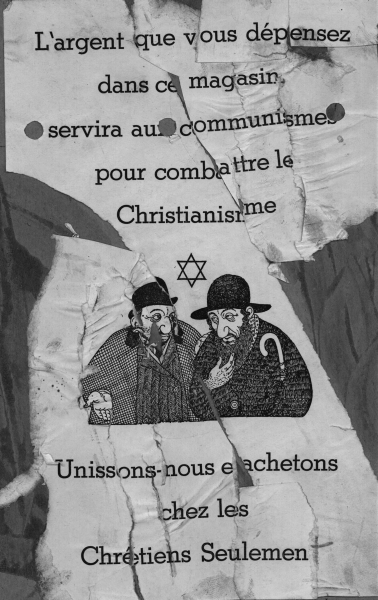Achat chez nous
1920 - 1940
St-Laurent et des Pins
During the 1920s, informal nationalist organizations known as Achat chez nous leagues began cropping up across Quebec. Born of the genuine economic and nationalist frustrations of French Canadians, the movement Achat chez nous (“buy from us” or “buy from home”) became a campaign generally aimed at boycotting Jewish stores. The movement was not broadly successful, but did achieve a high degree of notoriety due, in large part, to the coalescing of a few socio-political factors: the general economic suffering of the time, a heightened environment of antisemitism, and a particular brand of ethno-nationalism espoused by many of the political and religious leaders of the day.
It was hardly coincidental that this programme materialized during the Great Depression: widespread unemployment amongst working- and middle-class French Canadians bred understandable resentment toward the predominantly English-speaking owners of industry. This sentiment led proponents of Achat chez nous to encourage buying products from their fellow French Canadians. However, the focus on boycotting other owners was not aimed primarily at the English-speaking elite, but rather at small-scale Jewish merchants. Antisemitism and xenophobia raged during the interwar years, and the easiest way for the leaders of the day (including Premier Maurice Duplessis and the Abbé Lionel Groulx) to explain widespread unemployment was to identify a scapegoat. In this case, the economic depression was allegedly caused by the unfair and corrupt business practices of “foreigners,” namely Jews. Interestingly, Jews were simultaneously condemned for bringing communism to Quebec and for representing the worst kind of capitalist ownership. What began as a movement to support French Canadian entrepreneurs soon morphed into a doctrinaire boycott of Jewish businesses. This shift was perhaps best evidenced by the promotion of a connected boycott, aimed at Jewish stores in Ottawa, which was led by a particularly vehement Achat chez nous supporter, the noted fascist and anti-Semite Adrien Arcand.
Insofar as the movement was based in formal organizations, these groups were sometimes attached to parishes, Jeune-Canada branches, or St-Jean-Baptiste Societies. However, it was the press, especially the various types of nationalist newspapers, who most markedly adopted the movement. Through the pages of Le Devoir, La Nation, L’action française (and its successor, L’action nationale), the “merits” of the movement were asserted. In the end, despite widespread support from the press, political, and religious leaders for Achat chez nous, the movement was broadly unsuccessful in its stated aim to end Jewish business ownership in Quebec. In no small part, this result was thanks to the masses of French Canadian citizens whose adherence to this policy was fleeting or non-existent.
Compiled by Sarah Woolf
Links
Liens
Anti-Semitism - The Canadian EncyclopediaSources
Anctil, Pierre. Le rendez-vous manqué: les Juifs de Montréal face au Québec de l'entre-deux-guerres. Quebec: Institut québécois de recherche sur la culture, 1988.
Anctil, Pierre, Gérard Bouchard and Ira Robinson. Juifs et Canadiens français dans la société québécoise. Sillery: Septentrion, 2000.
Davies, Alan T. Antisemitism in Canada: History and Interpretation. Waterloo, Ontario: Wilfrid Laurier University Press, 1992.
Dumont, Fernand, Jean-Paul Montminy, and Jean Hamelin. Idéologies au Canada français, 1930-1939. Histoire et sociologie de la culture series, no 1. Quebec: Presses de l'Universite Laval, 1978.
Lacoursière, Jacques. Histoire populaire du Québec: 1896 à 1960. Sillery: Septentrion, 1995.
Langlais, Jacques, and David Rome. Jews & French Quebecers: Two Hundred Years of Shared History. Waterloo, Ontario: Wilfrid Laurier University Press, 1991.
Oliver, Michael. The Passionate Debate: the Social and Political Ideas of Quebec Nationalism, 1920-1945. Dossier Québec series. Montréal: Véhicule Press, 1991.
Walker, James W. St. ‘Race,’ Rights and the Law in the Supreme Court of Canada: Historical Case Studies. Waterloo, Ontario: Wilfrid Laurier University Press, 1997.
*Image courtesy of the Canadian Jewish Congress Charities Committee National Archives.


This project is funded in part by the Government of Canada.
Ce projet est financé en partie par le gouvernement du Canada.
Ce projet est financé en partie par le gouvernement du Canada.
This project is funded in part by the Government of Canada.
© 2011-2015 Museum of Jewish Montreal, All Rights Reserved.
Site by Air Code Design inc. ![]()
© 2011-2015 Musée du Montréal Juïf, Tous droits réservés. Site par Air Code Design inc. ![]()
